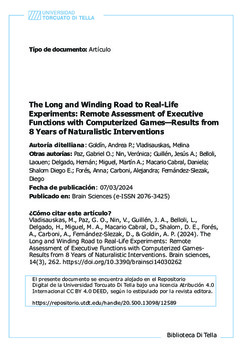| dc.rights.license | https://creativecommons.org/licenses/by/4.0/ | es_AR |
| dc.contributor.author | Goldín, Andrea P | es_AR |
| dc.contributor.author | Vladisauskas, Melina | es_AR |
| dc.contributor.author | Paz, Gabriel O | es_AR |
| dc.contributor.author | Nin, Verónica | es_AR |
| dc.contributor.author | Guillén, Jesús A | es_AR |
| dc.contributor.author | Belloli, Laouen | es_AR |
| dc.contributor.author | Delgado, Hernán | es_AR |
| dc.contributor.author | Miguel, Martín A | es_AR |
| dc.contributor.author | Macario Cabral, Daniela | es_AR |
| dc.contributor.author | Shalom Diego E. | es_AR |
| dc.contributor.author | Forés, Anna | es_AR |
| dc.contributor.author | Carboni, Alejandra | es_AR |
| dc.contributor.author | Fernández-Slezak, Diego | es_AR |
| dc.date.accessioned | 2024-04-12T18:59:47Z | |
| dc.date.available | 2024-04-12T18:59:47Z | |
| dc.date.issued | 2024-03-07 | |
| dc.identifier.uri | https://repositorio.utdt.edu/handle/20.500.13098/12589 | |
| dc.identifier.uri | https://doi.org/10.3390/brainsci14030262 | |
| dc.description.abstract | Mate Marote is an open-access cognitive training software aimed at children between
4 and 8 years old. It consists of a set of computerized games specifically tailored to train and evaluate
Executive Functions (EF), a class of processes critical for purposeful, goal-directed behavior, including
working memory, planning, flexibility, and inhibitory control. Since 2008, several studies were
performed with this software at children’s own schools in interventions supervised in-person by
cognitive scientists. After 2015, we incorporated naturalistic, yet controlled, interventions with
children’s own teachers’ help. The platform includes a battery of standardized tests, disguised as
games, to assess children’s EF. The main question that emerges is whether the results, obtained with
these traditional tasks but conducted without the presence of researchers, are comparable to those
widely reported in the literature, that were obtained in more supervised settings. In this study, we
were able to replicate the expected difficulty and age effects in at least one of the analyzed dependent
variables of each employed test. We also report important discrepancies between the expected and
the observed response time patterns, specifically for time-constrained tasks. We hereby discuss the
benefits and setbacks of a new possible strategy for this type of assessment in naturalistic settings.
We conclude that this battery of established EF tasks adapted for its remote usage is appropriate to
measure the expected mental processes in naturalistic settings, enriching opportunities to upscale
cognitive training interventions at schools. These types of tools can constitute a concerted strategy to
bring together educational neuroscience research and real-life practice. | es_AR |
| dc.description.sponsorship | Este artículo se encuentra originalmente publicado en la revista Brain Sciences (e-ISSN 2076-3425) | es_AR |
| dc.format.extent | 25 p. | es_AR |
| dc.format.medium | application/pdf | es_AR |
| dc.language | eng | es_AR |
| dc.publisher | Brain Sciences (e-ISSN 2076-3425) | es_AR |
| dc.relation.ispartof | Brain sciences,
14(3), 262. | en |
| dc.rights | info:eu-repo/semantics/openAccess | es_AR |
| dc.subject | Children | es_AR |
| dc.subject | Transfer | es_AR |
| dc.subject | Videogames | es_AR |
| dc.subject | Cognitive training | es_AR |
| dc.subject | Schools | es_AR |
| dc.subject | Child-ANT | es_AR |
| dc.subject | Heart–Flower Stroop task | es_AR |
| dc.subject | Corsi blocks | es_AR |
| dc.subject | ToNI | es_AR |
| dc.subject | Tower of London | es_AR |
| dc.title | The Long and Winding Road to Real-Life Experiments: Remote Assessment of Executive Functions with Computerized Games—Results from 8 Years of Naturalistic Interventions | es_AR |
| dc.type | info:eu-repo/semantics/article | es_AR |
| dc.type.version | info:eu-repo/semantics/publishedVersion | es_AR |

